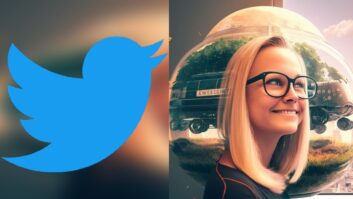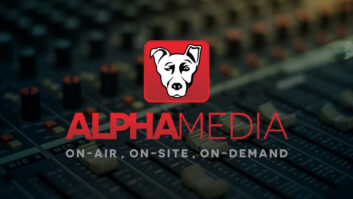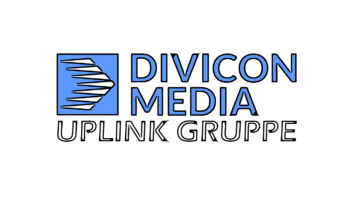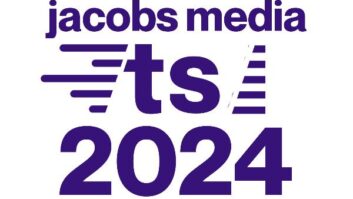Alpha Media is on the acquisition prowl again after consuming Digity’s 116 stations in 26 markets, positioning the Portland, Ore.-based company as the fourth-largest radio ownership group in the United States as measured by number of stations, with 252 outlets in 54 markets, third in market penetration, according to the company.

Wilson is shown with his dogs. Bear is on the left, Muddy at right. “Bear runs the company. I’m just this figurehead,” Wilson says. That’s zero to 252 stations in just six years. The company recorded $115.1 million in over the air advertising revenue in 2014, according to an estimate from research firm BIA Kelsey.
You’d think Alpha Chairman Larry Wilson — who sold Citadel Communications in 2001 for $2.1 billion, according to his company biography — might at least kick back now, having satiated his latest appetite for national growth and audience aggregation by doubling Alpha’s size with the Digity acquisition.
Hardly. Wilson, 70, tells Radio World that he’s got his eye on 25 family-owned properties because “families care about employees.” Wilson also said he spends his days perusing a database of 10,000 U.S. stations, “the ones that Clear Channel, er, iHeartMedia, doesn’t own.”
To understand Wilson’s motivation for plunging back into the radio business with clear-eyed fervor, you need to meet Bear, the ubiquitous Alpha rescue dog, who appears in caricature at Alpha’s HQ, in print and online — even as an employee tattoo, we hear.
“Bear runs the company. I’m just this figurehead,” says Wilson. “I rescued him up in Montana while I was distributing my wife’s ashes in Glacier National Park. He was badly abused, with a busted-in face, an eye kicked out, an awful infection, but Bear is big and healthy now.” The company’s name and logo are a nod to Wilson’s love of dogs, referencing “alpha dogs.”
You could say that Bear actually rescued Wilson, who had left Citadel in 2001 to take care of his invalid wife, Claire. She died of cancer in 2008. “I was a lost soul, and some of my old partners asked me to get back in the radio business,” Wilson said.
One of those partners was Bob Proffitt, the “Prophet of Profit,” Alpha’s president and CEO and the former COO at Citadel.
OK, the winning team is back together, they’re on a buying spree — but how do they make money instead of just spending it? By buying right, investing in and empowering all-star local talent, acquiring live performance venues and always remembering it’s about great local content. It’s also about multimedia, interactive, the FM receiver chip and free-but-scarce concert tickets that build local listener buzz and loyalty.
Its wide-ranging initiatives include the kink.fmwebsite and listener community, utilizing more video and qualitative statistics in sales presentations, and adding supplementary smartphone video reporting to news stories online. Additionally, Alpha Media is testing programmatic online ad sales in a few markets, offering access to the stations’ Internet presence via customized, separate “lifestyle” sites for these advertisers.
NextRadio is a significant initiative within the industry, Alpha Media feels; the company views it as a beneficial asset to its stations in regards to expansion as well as continuing to be the foundation for news and local community information.

Additionally, Alpha Media stations produce different content for all of the platforms with which fans interact, such as Facebook, Instagram and Twitter. Wherever fans are, the company is “holding a conversation with them, sharing on air videos, contesting and more,” said Vice President of Marketing Randi P’Pool.
“Radio is now the number one medium, surpassing TV for the first time in decades,” Proffitt said. “That is a proven fact by a recent Nielsen study. Also, for the first time, with another study, radio can show ROI up to 17-1 in some categories. That is significant.”
Proffitt says, “Pandora and Spotify are music collection services, and they are very good at that. But you listen to them when you want to get away, change your mood, listen to music in a quiet area. Commercials seem out of place, and often you just hear them trying to get you to go to their ‘premium’ model, which costs and is commercial-free.
Only 4 million customers have signed up; Pandora gets 80 percent of its revenue from commercials. We believe streaming is a supplement, not a substitute to broadcast radio.”
Alpha’s radio advertising breakout is an 80/20 business, according to Wilson — 80 percent of revenue is locally generated while 20 percent comes from national buys, like AT&T and Subway. But even national accounts can have a local spin on Alpha’s stations, as is the case with Subway, with jocks reading and personalizing timely localized spots while munching on Subway sandwiches delivered to the station. Subway franchisees eat it up, according to Proffitt.

Larry Wilson“I ADVOCATE FOR ENGINEERS”
Buying properties starts with consulting Michael Everhart, Alpha’s director of engineering. Everhart has the crucial role of station evaluation and integration specialist. His acquisition experience, decision-making and oversight are so valued that Everhart is as respected as a C-level executive.
According to Wilson, “Everhart is the best engineer I’ve ever known. He knows what the signal does as far as bringing in revenue. He’s very important part of our top management team.”
Everhart sees his role as a profit center, an asset and investment to be exploited cheerfully by management.
“In a lot of places engineers are viewed as nothing but an expense to be reduced or eliminated as much as possible,” he said. “I advocate for engineers to be included in upper-level management discussions, in long-range planning because the work that they do is often pivotal to the success of the operation. I also advocate for the recruiting and development of engineers.”
At the earliest hints of the Digity acquisition, Everhart was included in the conversation, as he has been since 2009. Everhart’s first job in the acquisition was to give reassurance, to build respect, confidence and trust among the Digity folks he engaged. A spokesperson for Alpha Media declined comment for this story about the company’s staffing plans; but Everhart does not seem to be the guy with a sword, slicing and dicing staff while cutting up existing formats and procedures.
Wilson says, “If there’s a station that is not working, we roll up our sleeves and we fix it. People need to be empowered, so we get them on a course we all agree on, monitor them but stay out of their way.”
While Everhart and his team couldn’t visit all 116 Digity properties in person, he says he worked closely with Lloyd Collins, his Digity engineering counterpart, and Digity CEO Dean Goodman to head off potentially expensive problems, such as “being off the air for an extended period of time, having a license that is revoked or under examination, two things that impact revenue generation,” said Everhart. “You’ve got to have a good reputation with the FCC in an acquisition, an upgrade, a move, anything involving a transfer or license application.”
Everhart asks questions like: Is there a 30-year-old unsupported transmitter or a deteriorating tower? Does existing software/hardware meet our compatibility needs? Do call letters, frequency, power level and transmitter coordinates as listed in FCC databases reflect the reality that we see when we go in for a visit?
For Everhart, it’s about due diligence and following an established playbook, understanding the value of assets to be acquired, plus determining deficiencies that could become negotiating points as the acquisition moves forward.
Everhart thinks like an uptime marketer, too.
“What you’re really trying to do is get an audience into your tent, whether that tent is virtual, electronic, social media, software driven or even a real tent,” he said. “In Alpha’s case, that’s the deeply local and relevant connection to the audience in the markets that we serve. We make it very easy for them to connect, as platform-agnostic as possible. And then entertain them and keep them around.”

Mike EverhartMANAGING SCARCITY, BUILDING LOYALTY
Historically, local DJs have been visible figures at concerts, introducing name acts, plugging the local station and attaching a face to the voice. That model is alive and well at Alpha Media but with a twist; the company is now in the live performance business, developing and running its own venues and, according to the company, making money at it.
First, a little perspective: According to an August 2015 New York Times article, live music revenue globally grew from $10 billion in 1999 to almost $30 billion last year, as determined by data assembled by live-music service Songkick. Average ticket prices rose 150 percent between 1997 and 2012. The audience demand for live music has accelerated as price-driven ticket scarcity has excluded major fan segments.
Enter Alpha Media with its products. They include the Skype Studio in Portland, with a capacity of 168, which supports the company’s six radio stations in that market.
Is it a profit center, an interactive laboratory, a community connection? “It’s all of the above, and you named them, one-two-three,” said Proffitt.
“Number one is, we do make money off of it. We don’t sell tickets. You got to be our friend. You got to earn them through being a frequent listener. You got to win them on the air. It’s an up-close-and-personal way to connect, but we do sell sponsorships.” Alpha owns the venue while Skype, part of Microsoft, is the title sponsor, having purchased naming rights.
Wilson said, “People love to interact with artists and it drives radio listenership. People meet an artist, they come back to our station to hear the artist. That’s just the way it works.”
Alpha Media also runs the Alamo Lounge in San Antonio, Texas; WIIL(FM) Rock’s Studio East in Kenosha, Wis., with a capacity of 75 including standing room; a Columbia, S.C., theater under conversion that will serve six Alpha stations; and a former Adelante TV studio in Salt Lake City, Utah, which has been repurposed into a intimate performance lounge seating 40, serving three Alpha Spanish-language stations. Listeners must tune in to win these free tickets to all the venues.
“Alpha hires on-air super stars and lets them do their job, get involved in the community, charities and other local causes — that’s it,” said Wilson. “We want to keep our product great, and we work very hard at that. It pays off. It’s a little harder when you got 252 stations, but we’ll do it. We’ve done it before when I started Citadel in 1984.”
Larry Wilson. He’s back, he’s bad and nationwide. Watch out, iHeart!
Christopher Springmann is the producer of the syndicated “Life, Love & Health” health talk show.












